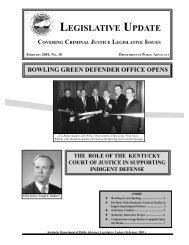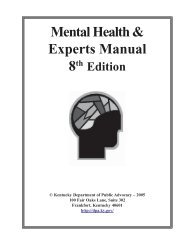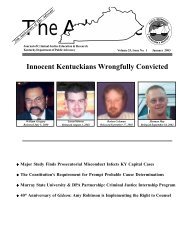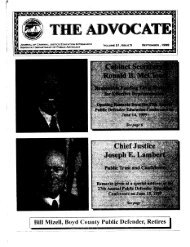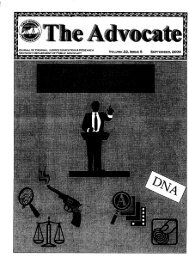May 2002 - Department of Public Advocacy
May 2002 - Department of Public Advocacy
May 2002 - Department of Public Advocacy
Create successful ePaper yourself
Turn your PDF publications into a flip-book with our unique Google optimized e-Paper software.
Continued from page 39<br />
HEARSAY<br />
Woodall claimed defense psychologist Phillip Johnson’s testimony<br />
that Woodall had failed to complete the sex <strong>of</strong>fender<br />
treatment program during a prior prison sentence was inadmissible<br />
hearsay not admissible under any KRE 802 exception.<br />
The statement was admissible under KRE 703 because it<br />
tended to show the basis <strong>of</strong> Johnson’s opinion that Woodall<br />
was mentally ill. Id., at 127-128.<br />
OTHER ISSUES<br />
The Court also considered issues on the restriction <strong>of</strong> voir<br />
dire, “for cause” strikes, instructions, denial <strong>of</strong> a continuance,<br />
crime scene photographs, number <strong>of</strong> peremptory challenges,<br />
Woodall’s guilty plea, witness issues and arguments<br />
relating to the death penalty, but broke no new legal ground.<br />
Hodge v. Commonwealth and<br />
Epperson v. Commonwealth,<br />
— S.W.3d — (rendered September 27, 2001)<br />
(modified March 21, <strong>2002</strong>)<br />
Majority:<br />
Minority:<br />
Johnstone (writing), Lambert, Cooper, Keller<br />
Wintersheimer (writing), Graves<br />
Stumbo not sitting<br />
The Supreme Court remanded the Letcher County convictions<br />
<strong>of</strong> Roger Epperson and Benny Hodge for a post-conviction<br />
evidentiary hearing. Epperson and Hodge v. Commonwealth,<br />
Ky., — S.W.3d — (2001).<br />
JURY TAMPERING<br />
Both men alleged numerous issues related to jury tampering,<br />
including visits by the prosecutor, provision <strong>of</strong> alcoholic<br />
beverages and a decision as to the foreman <strong>of</strong> the jury, guilt<br />
and punishment on the first night <strong>of</strong> sequestration.<br />
In their motions, Epperson and Hodge had alleged jury tampering<br />
but had not included the bases for the various charges.<br />
The Court found that the allegations had been pled sufficiently:<br />
rather than a blanket allegation, both men had spelled<br />
out specific incidents, such as the Commonwealth’s<br />
Attorney’s daily ex parte contact with the jurors and that<br />
jurors had been provided with alcohol, newspapers and personal<br />
visits during their supposed sequestration. The Court<br />
restated the correct procedure for examining an RCr 11.42<br />
action: the trial court must focus on whether the post-conviction<br />
motion raises “an issue <strong>of</strong> fact that cannot be determined<br />
on the face <strong>of</strong> the record.” Id., slip op. at 4, quoting Lay<br />
v. Commonwealth, Ky., 506 S.W.2d 507, 508 (1974) and<br />
Stanford v. Commonwealth, Ky., 854 S.W.2d 742, 743-44 (1993).<br />
Epperson and Hodge’s allegations <strong>of</strong> jury tampering rose to<br />
that level. Furthermore, jury tampering in a criminal trial is<br />
presumed to be prejudicial. Id ., citing Remmer v. United<br />
States, 347 U.S. 227, 229 (1954). Epperson and Hodge alleged<br />
facts more grave than those in Remmer.<br />
THE ADVOCATE Volume 24, No. 3 <strong>May</strong> <strong>2002</strong><br />
40<br />
INEFFECTIVE ASSISTANCE OF COUNSEL<br />
AT THE PENALTY PHASE<br />
Counsel for neither Epperson nor Hodge presented witnesses<br />
at the penalty phase, but made stipulations pertinent to each<br />
man. Id., at 5-6.<br />
The Supreme Court agreed with the trial court that defense<br />
counsel has no duty to present any or all evidence, but found<br />
that the trial court had used the incorrect procedure in its<br />
opinion. The Court laid out a three-part analysis: 1) determine<br />
whether a “reasonable investigation” would have uncovered<br />
mitigating evidence; 2) determine whether defense<br />
counsel made a tactical decision not to present the evidence;<br />
3) should the choice be found not tactical and that counsel’s<br />
performance was deficient, then the court must determine<br />
whether there is a reasonable probability that the outcome<br />
would not have been different. Id., at 8, quoting Porter v.<br />
Singletary, 14 F.3d 554, 557 (11 th Cir. 1994).<br />
It “appear[ed]” that a mitigation investigation had not been<br />
done, but the Court left for an evidentiary hearing whether<br />
this allegation could be borne out. The Court instructed trial<br />
courts (and counsel) that “[b]efore any possible mitigating<br />
evidence can be weighed in a meaningful manner, that evidence<br />
first must be determined and delineated.” Id., at 9. The<br />
Court appears to indicate that post-conviction counsel must<br />
be prepared to present facts in the post-conviction motion<br />
and witnesses at the evidentiary hearing demonstrating the<br />
penalty phase which could or should have been put on at<br />
trial.<br />
The Court did not address other claims presented in the RCr<br />
11.42 motions regarding snitch and co-defendant issues and<br />
conflicts <strong>of</strong> interest on the part <strong>of</strong> both Hodge and Epperson’s<br />
defense counsel.<br />
Ronnie Bowling v. Commonwealth,<br />
— S.W.3d — (rendered March 21, <strong>2002</strong>)<br />
Majority:<br />
Johnstone (writing), Cooper, Graves, Keller,<br />
Wintersheimer<br />
Stumbo, without opinion, concurs in result only<br />
Lambert, not sitting<br />
The Court reiterates its RCr 11.42 mandate that pro<strong>of</strong> <strong>of</strong> claims<br />
in post-conviction consist not <strong>of</strong> a bare allegation contained<br />
in a post-conviction pleading but something more tangible.<br />
See Epperson, supra. Also, although the Court stated in T.C.<br />
Bowling et al., Ky., 926 S.W.2d 667 (1996), that an ability to<br />
amend could be liberally given, in this post-Bowling action,<br />
the Court shows little patience with an incomplete investigation<br />
at the time an RCr 11.42 action is filed despite the severity<br />
<strong>of</strong> a capital case and the rush to file the RCr 11.42 to<br />
premature stay <strong>of</strong> a warrant <strong>of</strong> execution. See Ronnie Bowling<br />
v. Commonwealth, slip op. at 23.<br />
BRADY VIOLATION<br />
A federal district judge’s statement that he was sentencing<br />
Chappell to the minimum “under the situation we have here,”



